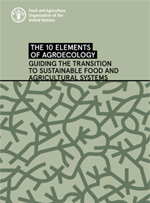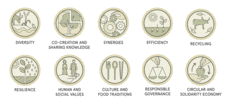Agroecology is an approach to food production that acknowledges our role within nature and seeks to redress the balance of our natural systems while improving the quantity and quality of the food we can produce.
Here are a few definitions:
Agroecology is “the science of applying ecological concepts and principles to the design and management of sustainable food systems” (Gliessman, 2007)
‘Agroecology is a scientific discipline, a set of practices and a social movement. As a science, it studies how different components of the agroecosystem interact. As a set of practices, it seeks sustainable farming systems that optimize and stabilize yields. As a social movement, it pursues multifunctional roles for agriculture, promotes social justice, nurtures identity and culture, and strengthens the economic viability of rural areas.’ FAO, 2018
Agroecology provides solutions to many of the crises we face today. The dominant narrative in both business and government work around climate change is that we can use technology to fix the problems caused by industrialisation. Or more simply, the problem is the solution. Carbon capture, renewable energy, recycling, and even tree planting all make demands on our resources – continuing to burn fossil fuels and extracting precious resources, at the expense of human wellbeing as well as the planets. Agroecology seeks an alternative and science driven method to solve the problems caused by ‘conventional’ agrigulture by working with our local ecologies. Permaculture, regenerative agriculture and sustainable farming can all be seen as methods of applying agroecology.
10 elements of Agroecology

Diversity: diversification is key to agroecological transitions to ensure food security and nutrition while conserving, protecting and enhancing natural resources.

Co-creation and sharing of knowledge: agricultural innovations respond better to local challenges when they are co-created through participatory processes.

Synergies: building synergies enhances key functions across food systems, supporting production and multiple ecosystem services.

Efficiency: innovative agroecological practices produce more using less external resources.

Recycling: more recycling means agricultural production with lower economic and environmental costs.

Resilience: enhanced resilience of people, communities and ecosystems is key to sustainable food and agricultural systems.

Human and social values: protecting and improving rural livelihoods, equity and social well-being is essential for sustainable food and agricultural systems.

Culture and food traditions: by supporting healthy, diversified and culturally appropriate diets, agroecology contributes to food security and nutrition while maintaining the health of ecosystems.

Responsible governance: sustainable food and agriculture requires responsible and effective governance mechanisms at different scales – from local to national to global.

Circular and solidarity economy: circular and solidarity economies that reconnect producers and consumers provide innovative solutions for living within our planetary boundaries while ensuring the social foundation for inclusive and sustainable development.
Publications

The 10 Elements of agroecology: guiding the transition to sustainable food and agricultural systems
Other resources
- FAO Council, 163rd Session – The Ten Elements of Agroecology
- The 10 Elements of Agroecology: enabling transitions towards sustainable agriculture and food systems through visual narratives

